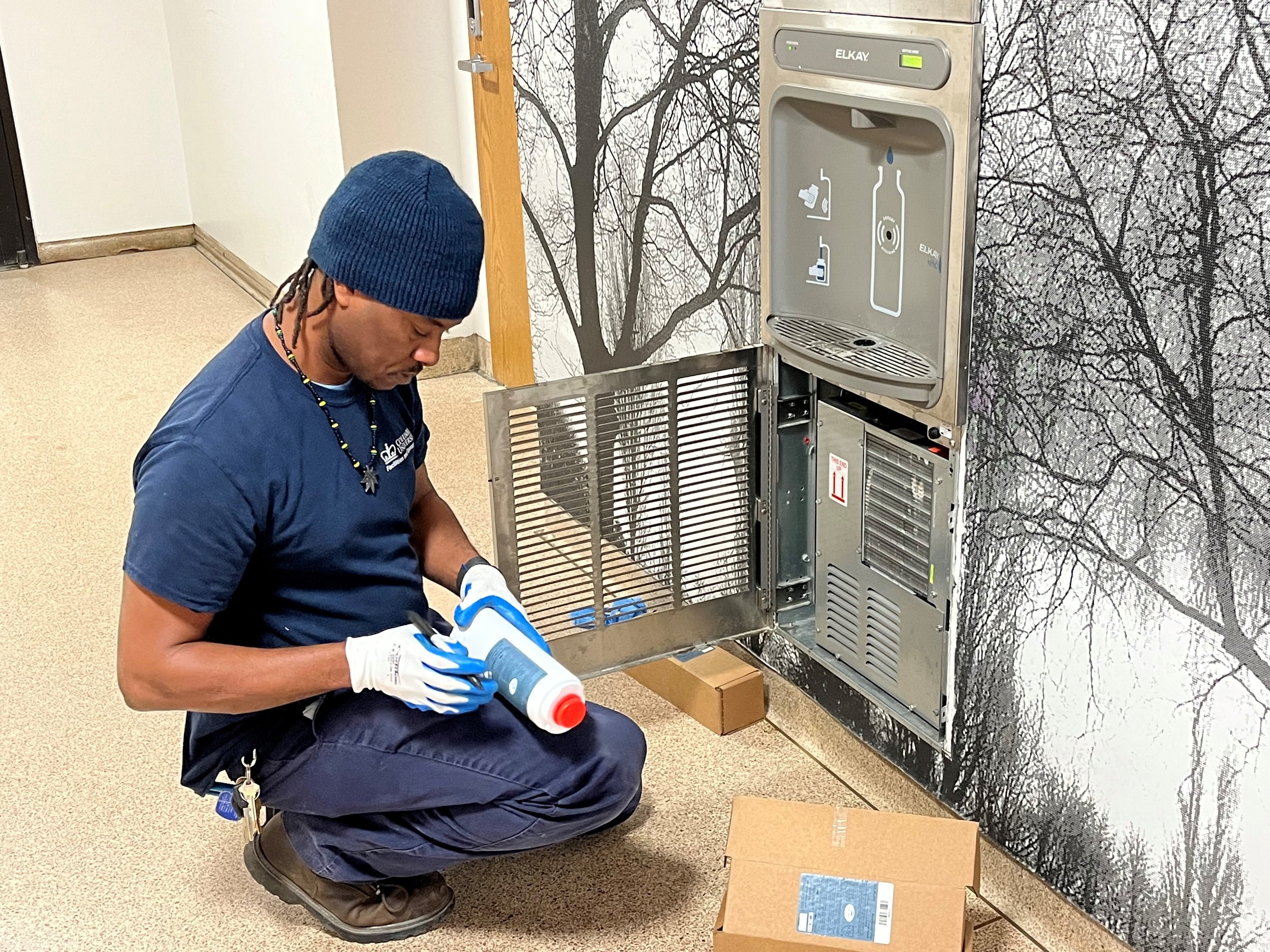CAMPUS NEWS: SIPA water fountains – Repair staff are standing by ready to fix, but someone has to ask
Oral Brown, a plumbing mechanic for Columbia University's Operations Department, replaces a water filter at a fourth-floor water fountain in the School of International and Public Affairs (SIPA) (Photo/Noah Lichtman)
By Anya Schiffrin
SIPA students love kvetching about the water fountains not working. Indeed, the dispensers that refill bottles are so slow that traffic jams build up before classes on the fourth and fifth floors. The problem has gotten so bad that it now features regularly on an anonymous Instagram feed that has 411 followers and encourages unnamed postings about life at SIPA.
However, students don’t seem to be sending in complaints to the facilities department even though they have signs all over the building telling people where to text. When asked why they don’t file complaints, students mostly give me blank looks.
“I’ve never seen that in my life,” said a student before I directed her to the bathroom to see the sign. “Maybe they need to change the color of the signs,” she continued.
Other students noted that getting water fountains repaired doesn’t seem to be the point. Venting is.
“It’s a camaraderie thing. Everyone complains about the water fountains,” explained SIPA student Kendall Gee.
Another SIPA student, Jason Williams Bellamy, said that the mysterious ways of Columbia add to the confusion: “People don’t know how to get in contact with facilities and probably don’t have a great understanding of facilities jurisdictions. They might think a SIPA water fountain would be under the jurisdiction of SIPA facilities or that we should report the problem to the Office of Student Affairs.”
I confess that I also wondered who is in charge of water fountains so I emailed the Columbia University Facilities and Operations Department and contacted Noah Lichtman, Executive Director of Communications, and Marjorie Stockford, Executive Director for Client Services. Even before that, as an experiment, I texted in several complaints about water fountains that had slowed to a trickle.
Here is what I found out from the Operations Department: Columbia University employs several hundred mechanics across all Facilities Operations, with approximately 15 assigned to the plumbing staff. These individuals are responsible for repairing and replacing water filters, as well as working on pipes, pumps, sewage systems, and the Uris pool, among other tasks. The team services over 50 buildings on the Morningside Campus.
Most water fountains experience low water pressure when their filter is no longer useful and needs replacement. The staff does not do regular checks of lightbulbs or water fountains. Rather they rely on alerts from individuals on campus. Reports to the CUFO Service Center are placed into the call and email queue for Service Center coordinators (also known as call center agents).
“We have a staff of 10 coordinators covering the Service Center 24/7, with up to four coordinators working on the same shift. Water filter replacement time varies depending on the volume and type of outreach to the Service Center at the time of the water fountain report. When call volume is low and routine, filters may be replaced within a day or two; when call volume is higher and/or urgent, the replacement could take as long as a week or more. When the request for repair comes to the Service Center, the coordinator puts the request in the plumbing shop’s work order queue and the plumbing supervisor assigns the job to one of his mechanics based on his resources and the other requests he’s receiving simultaneously,” Stockford wrote in an email.
So far this semester, Facilities has received only 20 complaints about water fountains. My colleagues are mystified: “Why don’t they just file a ticket? They’re very fast,” said one economist, explaining that Facilities monitors all the tickets and they know which classrooms have problems.
“If there is no chalk, or the blackboard is broken they come immediately and they fix it,” he added.
So will SIPA students start to file tickets when they see something is broken?
“To be fair, our generation loves to vent,” said SIPA second-year Khatdija Meghani.
Regarding my text message, I received a callback within seconds and, within days, the fifth-floor fountain was fixed.
Anya Schiffrin is the Director of the Technology, Media and Communications (TMaC) specialization at Columbia University’s School of International and Public Affairs.


